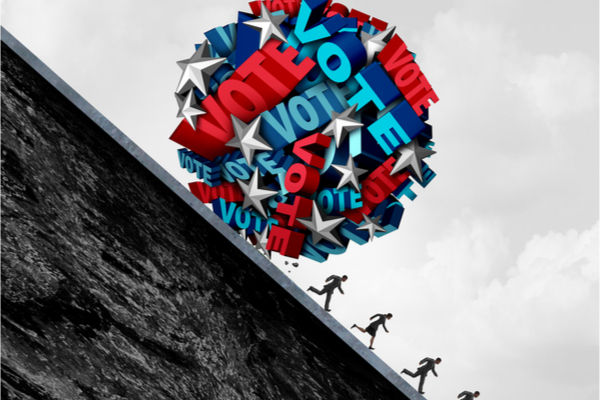By this point, we’ve all been living through a global pandemic for more than half a year. While dealing with Covid has been incredibly stressful, you’ve probably figured out how to manage the anxiety on some level. But there’s also a presidential election in the mix—an election that’s divided families and communities and arguably unleashed more anger and frustration than in any other election in recent memory. To vent their feelings, people are flooding social media with comments about how frazzled they are over the election and the events leading up to it.
“The election is bringing out my stress cooking,” one wrote. “I wish my stomach didn’t respond to stress the way it does,” another said. “This presidential election is literally destroying me.” The term “election stress disorder” is being thrown around lately to describe how people are feeling about the upcoming election. But what exactly is it, and is election stress disorder a legitimate medical diagnosis? Here’s what you need to know.
So what is election stress disorder?
For the record, this is not an actual medical diagnosis. But that doesn’t mean people can’t feel stress—and even really intense stress—around an election.
“Elections are high-stakes events which have long-lasting implications and serious consequences,” Monifa Seawell, MD, a board-certified psychiatrist in Atlanta, said in an interview with Health. “Election results can influence the direction of our more immediate neighborhoods, of our regions, of the states we live in, and also influence the direction of our country and how we experience life as residents of this country.” With that, she says, the stakes can feel pretty high.
This particular election has also been…intense. “There are a lot of negative themes coming across, including personal attacks and just a general sense of negativity,” says Thea Gallagher, PsyD, clinic director at the Center for the Treatment and Study of Anxiety at the University of Pennsylvania’s Perlman School of Medicine. And it can be hard to shut that out.
This intense level of election-related stress has happened before. The 2016 Stress in America survey, which is conducted by the American Psychological Association, found that 52% of Americans said the 2016 presidential election was a “very” or “somewhat significant” source of stress in their lives. Apparently, that level of stress is back again.
“This is showing up a lot on social media, with friends and family members saying things like, ‘If you don’t vote, we’re not friends anymore,’” Dr. Gallagher says. “People are drawing some lines in the sand about relationships, and that can feel really overwhelming.”
In this particular election, political leaders “appear to be as polarized as they have ever been,” Craig A. Smith, PhD, associate professor of psychology and human development at Vanderbilt University in Tennessee, said in the interview with Health.
“The two sides almost always appear to be in direct opposition with each other, and the leadership on each side appears to vilify not only the other side’s positions, but their leadership as well,” he says. “Given this, the election can easily be viewed as a crucial battle in a fundamental cultural war that can greatly affect one’s daily life, livelihood, and core cultural values.” As a result, he says, “it is easy to become extremely stressed about the election and its potential outcome.”
What does election stress disorder look like?
Stress related to the election can show up in people in the same ways that stress can pop up just about any other time, Dr. Seawell says: “By causing a disruption and some level of imbalance in your usual routine.”
That can mean struggling with sleep because you’re worried about what was said in a debate, or feeling mentally distracted due to news around the election. “Election-related stress may also manifest as you developing a fear of missing out on the ‘latest’ news and you might start checking your phone for news alerts every hour,” Dr. Seawell says.
It can also just make you cranky and irritable, adds Dr. Gallagher. “You can even feel anxious about being around certain people who you know have different political views, being worried that certain topics are going to come up,” she says.
How to cope with election stress disorder
There are a few ways to deal with this. One way, Dr. Smith says, is to “take direct action to try and help ensure that the election goes ‘your way.’” That can mean volunteering for a cause you care about, helping to campaign for the candidate you prefer, or joining an organization to help encourage people to vote.
But while you’re at it, don’t neglect the rest of your life. Dr. Seawell recommends trying to strike the right balance between being involved and active in the political process “and still maintaining a well-rounded life that is filled with other interests and activities.”
The second is to force yourself to take breathers when you feel like election news or conversation is getting to you. This can include tuning out the news and doing things like spending time with family or friends (online or in person), reading something non-political, or watching a movie, suggests Dr. Smith.
Also, if you find that engaging in a Facebook or Twitter argument is stressing you out, it’s really best to avoid that, Dr. Gallagher advises. Because social media comments are often anonymous, they can be particularly vicious and upsetting. If these kinds of comments stress you out, make a real effort to not come across them.
Overall, Dr. Gallagher recommends that you keep tabs on your feelings and continue to monitor them. And, of course, look out for yourself. “Don’t be afraid to put boundaries on what you’ll talk to certain people about,” she says.
If you’re feeling so stressed out these days that you find you’re not functioning well, Dr. Seawell says it’s a good idea to consider talking to a licensed mental health professional. “They can help you learn tools to better manage your stress levels,” she says.
—
Photo Credit: Lightspring / Shutterstock.com
